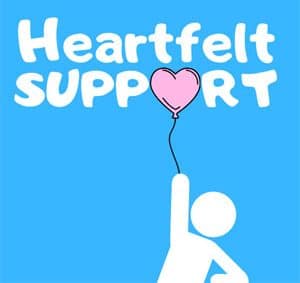
Our simple, three-step process for Art Therapy, Music Therapy Or Fun Music & Art Programmes.
REFERRAL FORM
Fill in our form (for yourself or on behalf of someone else) to get the ball rolling and we'll get onto it.
WE'LL CALL YOU
We'll work out the best person on our team to discuss art therapy with you, and they'll call or email you.
START SESSIONS
You'll be able to start sessions at our Morphett Vale art room and work with a registered Art Therapist or Music Specialist
Art Therapy
 Art therapy is a type of psychotherapy in which people use art to explore their emotions, thoughts, and behaviours. At Heartfelt Support, we provide art therapy sessions to Adelaide community members in order to encourage self-expression and self-exploration.
Art therapy is a type of psychotherapy in which people use art to explore their emotions, thoughts, and behaviours. At Heartfelt Support, we provide art therapy sessions to Adelaide community members in order to encourage self-expression and self-exploration.
A qualified and accredited art therapist leads our art therapy sessions. Clients are encouraged to create art in a way that is both comfortable and meaningful to them during a session. The art therapist will offer guidance and support as needed, but the emphasis of the session will be on the client’s personal exploration and expression.
Individuals of all ages and abilities can benefit from art therapy. It can be a useful tool for those dealing with mental health issues, trauma, grief, stress, or any other difficulties, bot related to disability or existing alongside. Art therapy can also be a fun and engaging way for people to learn new skills and find new interests.
We provide art therapy sessions in a safe and supportive environment at the Heartfelt Support Music and Art Centre in Morphett Vale. We believe in the healing and growth-promoting power of creativity and self-expression. We would be delighted to answer any questions you may have and assist you in beginning your art therapy journey.
Music Therapy
Music therapy is like having a Swiss Army knife for your well-being; it’s a versatile and dynamic approach to improving mental and physical health through the power of music. Imagine you’re feeling down or stressed, and instead of reaching for medication or a self-help book, you pick up an instrument or listen to a carefully curated playlist. That’s the essence of music therapy – it taps into the universal language of music to heal, soothe, and invigorate the mind and body.
The methods of music therapy are as diverse as music genres. Some sessions might involve you actively playing instruments, which helps with coordination and provides a sense of accomplishment. Other times, therapists might guide you through songwriting, which can be a powerful outlet for expressing emotions and telling their stories. Simply listening to music, allowing the melodies and rhythms to work their magic, reducing stress and anxiety can be beneficial.
One of the most beautiful aspects of music therapy is its ability to be tailored to you. A music therapist will fine-tune the approach based on your preferences, needs, and the goals you’re aiming to achieve. For someone struggling with speech after a stroke, singing simple melodies can help retrain the brain’s language centers. For a child with autism, music can be a bridge to better communication and social interaction, as the structure and patterns in music provide a non-threatening medium for connection.
The benefits of music therapy are not just anecdotal; they’re felt in real-time. It’s known to lower blood pressure, improve memory, manage pain, and even enhance cognitive skills. Think of a time when a song has given you chills or pumped you up before a big event – that’s a glimpse into the profound impact music can have. Now, imagine that power harnessed and directed with intention and expertise to help with specific health challenges.
For those with mental health issues, music therapy can be a lifeline. It offers a safe space to explore feelings, manage stress, and combat depression. It’s not about being good at music; it’s about using music as a tool for healing. The act of engaging with music can release dopamine – the feel-good neurotransmitter – and provide a natural boost to one’s mood.
In group settings, music therapy fosters a sense of community and belonging. Playing music with others can break down social barriers, teaching teamwork and empathy. It’s a shared experience that can bond people together, creating a support network that extends beyond the therapy session.
For young adults and beyond, music therapy offers a unique form of self-care. It’s a way to disconnect from the digital world and reconnect with oneself. In a world where we’re constantly bombarded with information and stimuli, music therapy provides a much-needed respite, a chance to tune out the noise and tune into our own inner rhythms.
Music therapy is an evidence-based practice that uses music to facilitate positive changes in emotional well-being, brain function, and physical health. It’s a personalised, creative, and non-invasive way to address a variety of health concerns, and its benefits are as universal as music itself. Whether you’re recovering from an illness, dealing with stress, or just looking to improve your quality of life, music therapy can offer a harmonious solution.
Boosting art and music in your life
Our Art and Music Studio at Woodcroft is a haven for people with a disability to explore creativity and experience the joys of art and music.
We offer both therapeutic and social programs, so there is something for everyone.
Our staff consists of registered therapists, experienced musicians and artists plus our popular support workers.
Programs
- Singing / Individual
- Painting and Drawing
- Small Group Social Karaoke
- Learn/practice and instrument
- Art Therapy
- Crafts
- Coming Soon: Jewellery Making
- Coming Soon: Music teaching
Useful links and more information:
From our blog: What does Research say about art therapy?
Our Art Therapists are accredited with ANZACATA. more info here
